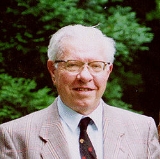
Fred Hoyle
Sir Frederick Hoyle, FRS (June 24, 1915 – August 20, 2001) was a British astronomer and science fiction author.
Sourced
- "Big Bang" theory
- The Nature of the Universe (1950)
- We are inescapably the result of a long heritage of learning, adaptation, mutation and evolution, the product of a history which predates our birth as a biological species and stretches back over many thousand millennia.... Going further back, we share a common ancestry with our fellow primates; and going still further back, we share a common ancestry with all other living creatures and plants down to the simplest microbe. The further back we go, the greater the difference from external appearances and behavior patterns which we observe today.
- Lifecloud: The Origin of Life in the Universe (1978), p.15
- Space isn't remote at all. It's only an hour's drive away if your car could go straight upwards.
- "Sayings of the Week", The Observer (9 September 1979)
- A junkyard contains all the bits and pieces of a Boeing 747, dismembered and in disarray. A whirlwind happens to blow through the yard. What is the chance that after its passage a fully assembled 747, ready to fly, will be found standing there? So small as to be negligible, even if a tornado were to blow through enough junkyards to fill the whole Universe.
- Arguing that living organisms could not have arisen by chance alone.
- The Intelligent Universe (1983), p.19
- The creationist is a sham religious person who, curiously, has no true sense of religion. In the language of religion, it is the facts we observe in the world around us that must be seen to constitute the words of God. Documents, whether the Bible, Qur'an or those writings that held such force for Velikovsky, are only the words of men. To prefer the words of men to those of God is what one can mean by blasphemy. This, we think, is the instinctive point of view of most scientists who, curiously again, have a deeper understanding of the real nature of religion than have the many who delude themselves into a frenzied belief in the words, often the meaningless words, of men. Indeed, the lesser the meaning, the greater the frenzy, in something like inverse proportion.
- Our Place in the Cosmos (1993), p.14
- When I was young, the old regarded me as an outrageous young fellow, and now that I'm old the young regard me as an outrageous old fellow.
- As quoted in Scientific American (March 1995)
- There is a coherent plan to the universe, though I don't know what it's a plan for.
- Attributed in The Oxford Dictionary of Quotations (1999) edited by Elizabeth Knowles and Angela Partington
- I do not see any sense in continuing to skirmish on a battlefield where I can never hope to win. The Cambridge system is effectively designed to prevent one ever establishing a directed policy — key decisions can be upset by ill-informed and politically motivated committees. To be effective in this system one must for ever be watching one's colleagues, almost like a Robespierre spy system. If one does so, then of course little time is left for any real science.
- As quoted by Bernard Lovell in Hoyle's obituary in The Guardian (23 August 2001)
- It has often been said that, if the human species fails to make a go of it here on the Earth, some other species will take over the running. In the sense of developing intelligence this is not correct. We have or soon will have, exhausted the necessary physical prerequisites so far as this planet is concerned. With coal gone, oil gone, high-grade metallic ores gone, no species however competent can make the long climb from primitive conditions to high-level technology. This is a one-shot affair. If we fail, this planetary system fails so far as intelligence is concerned.
Unsourced
- Hoyle: A star is basically a pretty simple object.
Voice from Audience: You'd look pretty simple too, Fred, from a distance of ten parsecs.- This exchange occurred at a seminar in Cambridge
Quotes about Hoyle
- Hoyle's enduring insights into stars, nucleosynthesis, and the large-scale universe rank among the greatest achievements of 20th-century astrophysics. Moreover, his theories were unfailingly stimulating, even when they proved transient.
- Martin Rees, in Hoyle's obituary in Physics Today (November 2001)
